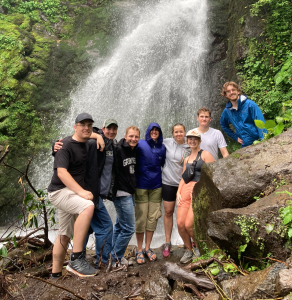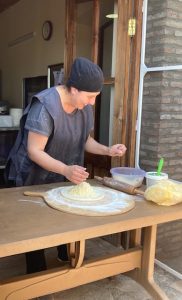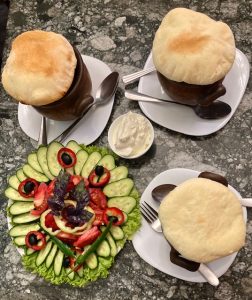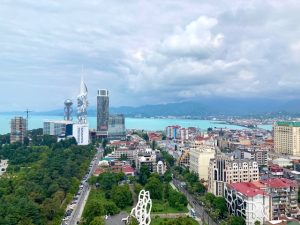 This past summer, I studied abroad for 8 weeks through the School of Russian and Asian Studies (SRAS) in Batumi, Georgia. It was my first time participating in a study abroad program, and it was certainly one of the best and most memorable summers I have ever had. As someone who loves the Russian language, it brought me so much joy to be able to speak Russian wherever and with almost whomever I encountered.
This past summer, I studied abroad for 8 weeks through the School of Russian and Asian Studies (SRAS) in Batumi, Georgia. It was my first time participating in a study abroad program, and it was certainly one of the best and most memorable summers I have ever had. As someone who loves the Russian language, it brought me so much joy to be able to speak Russian wherever and with almost whomever I encountered.
While I was in Batumi, I lived with a local family, a middle-aged woman, her mother, and their two cats. A typical weekday for me would start at 8:00am. My host mom prepared breakfast for me; some common foods were khachapuri (cheese stuffed bread), boiled sausages, eggs, blended soup, and dinner leftovers. After breakfast, I would typically walk on the boulevard along the Black Sea for 1-2 hours. By 10:30am, it was already hot, so I usually headed back home to do my homework and snack on matsoni (Georgian yogurt) and any fruit laying around. My classes started at 12:45. On the way there, I usually stopped by our group’s favorite bakery, Apetito, to buy a chicken or bean pastry for later.
 The Russian language program was organized by NovaMova International Language School based in Ukraine. Originally, our program was supposed to take place in Kiev, but given the circumstances, SRAS created a new program in Georgia in less than two months. I was placed into B2, or advanced, Russian. Since this level covers abstract topics, we went through a list of themes rather than relying on a textbook. Some topics included cybersecurity, government, criminology, war and terrorism, health, and sports. At the start of each theme, we were given a packet with vocabulary, readings, and discussion questions. Interspersed throughout the week were various grammatical subjects like prefixes, verbs of motion, and numerals. In addition, a student presented a news story from an article (from a Russian-language newspaper, of course!) at the beginning of class.
The Russian language program was organized by NovaMova International Language School based in Ukraine. Originally, our program was supposed to take place in Kiev, but given the circumstances, SRAS created a new program in Georgia in less than two months. I was placed into B2, or advanced, Russian. Since this level covers abstract topics, we went through a list of themes rather than relying on a textbook. Some topics included cybersecurity, government, criminology, war and terrorism, health, and sports. At the start of each theme, we were given a packet with vocabulary, readings, and discussion questions. Interspersed throughout the week were various grammatical subjects like prefixes, verbs of motion, and numerals. In addition, a student presented a news story from an article (from a Russian-language newspaper, of course!) at the beginning of class.
After class (at 4:15), a group of us usually went to the gym together or to the Black Sea beach for swimming or boating. SRAS organized a weekly workshop for us on topics ranging from pronunciation to Russian film to Georgian culture. For example, we went to a restaurant where the chefs taught us to make khachapuri, toured the Adjara Art Museum, and learned traditional national dances.
 I typically ate dinner at 7pm either at home or with our group. After dinner, a friend and I would sometimes do calisthenics by the beach with a young man vacationing from Moscow whom we befriended. I loved walking the streets late at night because that was the time when the city fell asleep and came to life all at once. The business of daily life retreated so it was peaceful, there was music playing in the background, the breeze from the sea was cool, and colorful lights shown everywhere.
I typically ate dinner at 7pm either at home or with our group. After dinner, a friend and I would sometimes do calisthenics by the beach with a young man vacationing from Moscow whom we befriended. I loved walking the streets late at night because that was the time when the city fell asleep and came to life all at once. The business of daily life retreated so it was peaceful, there was music playing in the background, the breeze from the sea was cool, and colorful lights shown everywhere.
Weekends were always full of excursions such as exploring old Tbilisi, wine tasting at Khareba Winery in Kvareli, hiking the Chalaadi glacier in Svaneti, exploring Prometheus Cave and Martvili Canyon, going to a tea factory, and doing a student-organized camping trip in a rainforest.
 I suppose no blog post is complete without some words on food. Khinkali (large dumplings filled with juicy ground meat)and ajapsandali (stewed eggplant and Bulgarian red peppers) were my favorites, but I am also proud to say that I am a member of the “clean-plate club” when it comes to Adjarian khachapuri (yes I ate an entire egg and cheese bread boat that I made myself!).
I suppose no blog post is complete without some words on food. Khinkali (large dumplings filled with juicy ground meat)and ajapsandali (stewed eggplant and Bulgarian red peppers) were my favorites, but I am also proud to say that I am a member of the “clean-plate club” when it comes to Adjarian khachapuri (yes I ate an entire egg and cheese bread boat that I made myself!).
It is bittersweet to look back on all the wonderful memories and friends I made in Georgia. The country’s fascinating culture, breathtaking natural wonders, and extensive history give it a special place in the world, right at the crossroads between Europe and Asia. I’m so grateful to have had the experience I did, to immerse myself in another part of the world, and to improve my Russian along the way. I hope to return to the country in the near future to explore it even more!
Alexandra Love is a senior with a double-major in Political Science and Music and a minor in Russian Culture.
